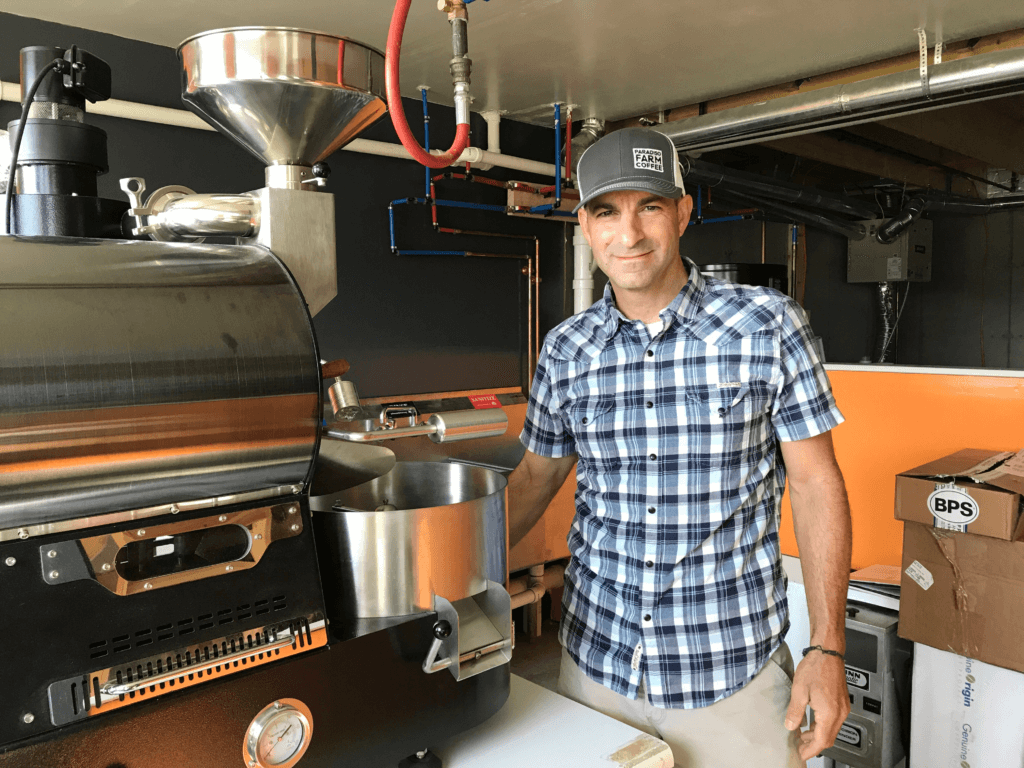Farm Series: Paradiso Farm

A degree in agronomy and horticulture, with a concentration in golf course management, led Steve Colangeli, now owner of Paradiso Farm in Charlotte, to manage high-end golf courses in Connecticut right out of school. By his mid-20’s it was time for a change. Vermont beckoned; Steve had friends here and had often come for winter skiing.
U32 High School needed a science teacher. Steve didn’t have a license to teach, but Essex High School had started the TAP Program for people wanting to teach and Steve became the first graduate of that program earning his license in the State of Vermont.
While teaching science, Steve started a horticulture class with an environmental curriculum. He acquired a large hoop house so he could have a school garden where he started growing winter greens. It was here he recognized that it was indeed possible to successfully grow greens during the winter in Vermont. Soon came the realization that people wanted fresh, local greens all year. Steve ran this program for several years at U32, teaching workshops to other science teachers about how to tie this curriculum into Vermont’s Common Core.
Steve has a passion for teaching, and he knows how to engage kids. “Teaching is not all about what you know,” he says. “Teaching is knowing how to reach kids through creative and entertaining ways to make learning fun and relevant.”
Moving to Charlotte was serendipitous. Middlebury High School contacted him about the program he was running at U32. His alternative program at Middlebury High school is teaching science and math. He teaches service-based projects with the kids like building 15 raised garden beds for residents in the area, starting with cutting the wood and then going to the various homes and building the beds. A greenhouse at the school allows the students to grow 300 to 400 pounds of greens for school lunches.
He sells winter greens in Charlotte through Your Farmstand. Looking outside the box for what else he could offer, he reviewed his notes from a workshop he’d taken thru NOFA about growing figs in northern climates. His passion for growing figs stems from tapping into his own Italian heritage. His grandfather and great-grandfather had grown figs in New York.
Steve purchased five fig trees from a grower in Boston. He learned to propagate them himself and six years later he has about 90 fig trees in his hoop house in various stages of growth and production. Not only does Paradiso Farm sell figs, they also sell fig trees.
Ginger and turmeric have also been growing in the hoop house. The challenge with both ginger and turmeric is the length of the growing season and the amount of patience the farmer needs to wait for the seed trees to snap out of dormancy and begin to grow. Using heat mats in the house, Steve starts them in early March and spends the next eight weeks watching them do nothing. Once they show signs of life, it’s into the ground where the plant grows and the bulb continues to develop. Harvest starts in early October and by Thanksgiving, all that Steve has grown is sold.
And then there’s Paradiso Coffee. Steve was always passionate about coffee and had the opportunity to purchase a small coffee roaster, suitable for roasting coffee at home. Buying small amounts of coffee online, Steve spent time learning about coffee, where beans come from, about the farmers who grow them and he grew more intrigued with the coffee story. Discovering that some companies had employees on the ground, working with the coffee farmers, making sure that their practices were sustainable both economically and environmentally and that the coffee produced is of high quality, Steve learned there are coffees that are truly organic, but due to the high price of certifications, are not certified organic.
In Papua New Guinea coffee grows wild and he found an “Indiana Jones” type of pilot who goes into the mountains and barters with the native peoples for coffee, bringing them fresh fish and medical supplies. Realizing that there was a market for freshly roasted, high quality coffee, Steve invested in a commercial coffee roaster and began purchasing green beans from various channels.
Starting small, Steve and his partner Dovie initially sold coffee to friends and neighbors, then launched his product at the Richmond Farmer’s Market and this year at the Shelburne Farmer’s Market. Last year he added a nitro cold brew coffee and now sells both hot and cold coffee at the market during the season.
Using technology and a large email list, Steve roasts to order and sends out what he’s roasting for coffee and his customers call or mail in orders knowing they can expect delivery of their freshly roasted coffee within 24 to 36 hours of roasting. He delivers, weather permitting, on a bicycle thus sustaining his passion for cycling, and sells at various local stores such as The Old Brick Store, Middlebury Co-op, Petes Greens Market in Waterbury, and Shelburne Farms retail store. His biggest seller is the coffee coming from Papua New Guinea. Steve has started catering weddings using a mobile coffee bar for custom pour over coffees and nitro cold brew on tap and is open to doing other special events.

